BAFA © 2010. All material here is copyrighted. See conditions above. |
Arkadij Bourkhanov

early music, lute,
teaches music at the Novosibirsk Conservatory, Russia.
|
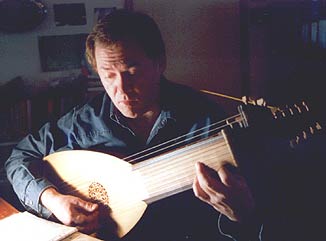
Arkadij Bourkhanov, Leiden, February 2001.
Photo: Sonja van Kerkhoff.
|
Arkadij is a member and the director of the ensemble of early music,
INSULA MAGICA (Magic Island)
Novosibirsk Philharmonic Society, 2001.
Arkadij Bourkhanov is holding the wooden trumpet on the far right.
|
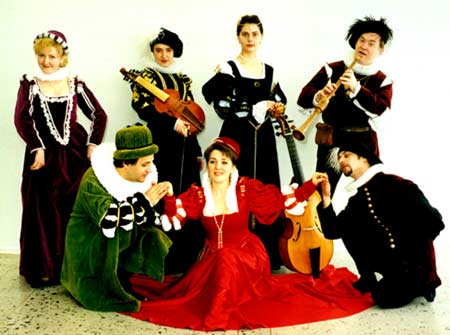
|

|
|
Insula Magica - The Early Music Ensemble of Novosibirsk State Philharmonic Society
Arkadij Bourkhanov, lute, baryton, viola de gamba, and artistic director, first on left.
Others in the ensemble: Elena Kondratova, soprano, Alla Vorontsova, alt, Alexei Barabnov, falsettist, baryton, spinet,
Serguei Tenitilov, bass, Irogr Tiouvaev, vocal director, spinet, tenor.
The Early Music Ensemble of Novosibirsk State Philharmonic Society, is currently the only professional group
in Russia performing Medieval, Renaissance and early Baroque music in the original style of performance.
The musicians have
been performing this music for over ten years now, performing on reconstructed instruments.
|
Since 1991 they have performed and toured abroad and
continue to do so as well as touring around Russia. Their music has been broadcast on "Radio on Russia", BBC radio, and Radio France.
Their programme, "Window On Europe", the material on this CD, won the All-Russian Folk Song prize in 1994. In 2001 they released their second CD, Renaissance Music.
Contact
Arkadij Bourkhanov, ark@mail.cis.ru
Novosibirsk State Philharmonic Society, 630007, Spartaka 11, Novosibirsk, Russia.
|
Arkadij Bourkhanov
During the 70 years of communism, all Western European musical styles were discouraged, and sometimes it was dangerous to play such music. There was a saying: "Today you play jazz and tomorrow you will sell our country". Even studying classical guitar was considered too western.
I studied classical guitar for five years during my years at school in Novosibirsk -the only music conservatorium east of the Ural mountains (covering an expansive part of Russia). Then I studied classical guitar and conducting for almost six years at the music school in Moscow.
|
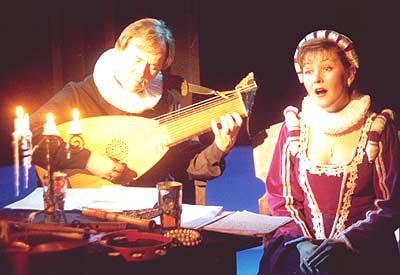
Insula Magica performing during their Echo of Poltava tour, 2000.
Review of Barca de Venetia per Padova by
Elena Frolova in the October 2000 issue of Arts Dialogue. Arkadij is on the left.
|
During this time, I became interested in music for the lute and the recorder and spent two years serving in the military ensemble as part of my military service. I returned to my home city, Novosibirsk, to graduate in my studies at the conservatory in the six-string classical guitar and the lute. It was the first time that someone in Russia had graduated in the lute and for a first in my academy for the guitar.
I taught myself how to play them, with the help of the professor of the balalaika. After I graduated, I developed a course in classical guitar at the conservatory and still teach it today. After this I spent three summers studying guitar in the academy of arts in Prague. I started playing lute more and then finally stopped playing the guitar altogether. It isn't possible to play both instruments professionally at the same time; for example, for the classical guitar you need long fingernails while for the lute you need short nails.
In 1991, I heard about an art forum that was being organized in Bratislava by the Bahá'í Association for the Arts. I had never heard of the Bahá'í Faith before. Because I had been to Czechoslovakia on a previous occasion, it was not difficult for me to travel to the art forum. I went for the music and ended up joining the Bahá'í Faith! In that same year, I helped establish the local assembly in Novosibirsk.
|

Insula Magica performing during their Echo of Poltava tour, 2000.
"...Choral composition based on a comical song is typical of the madrigal. In the subject matter of this piece, of everyday life
in Venetian times, partly grotesque, partly satirical, laced with touches of folk comedy, Banchieri took from the heart of tradition..."
Barca de Venetia per Padova, 1999, was reviewed by
Elena Frolova in the October 2000 issue of Arts Dialogue.
|
During these years of serving on the Bahá'í local and national administration, I was looking for a way to serve as a musician in a way that I felt comfortable as a professional musician. Some Bahá'ís had said that my music was not Bahá´í because there were no Bahá´í texts in it and because it was music from the past. I was told that the Bahá'í Faith was a new religion and so forth. Of course, no one said directly that my music was wrong, but I could feel the disappointment from Bahá'ís around me. And activities that used the arts to promote the Faith we had in Russia, such as the Zipopo (Institute for Positive Behaviour) talkshow and the Bahá'í Youth Dance Work-shops, were not my way of using the arts.
|
For me, art is not solely for teaching purposes. Artistic expression is a means of discovering myself, as well as a way to develop professionally, such as in performance. Then I discovered in the Bahá'í writings that all art is important whether it is related to teaching activities or not. I found quotations to support my view that art is a means of worship and spiritual development. In fact, if anything, we need the arts in order to develop spiritual expression.
During my research into the influence of divine revelation and in particular the Bahá'í Revelation on the development of culture and new cultural paradigms, I also discovered why I play ‘old forgotten’ Renaissance music now in this century!
The lute (from the Arabic: AL UD) appeared in Europe during the Middle Ages, after the invasion of southern Europe by the Arabs. So not only is my style of music a product of the mixing of cultures in the 14th century but my instrument is a development from this mixing as well. This music, like the Renaissance in general, is a result of the influence of the Islamic Revelation on Christian culture, which gave new life to Christian and anciet Greek values.
|
The musical revival of our times was initiated by the German composer, Felix Mendelssohn-Bartholdy's Historical Concerts in 1837-8. He was part of the first wave of the early music revival of works by composers such as Bach and Handel. For me there is much evidence that this revival was inspired by the Bahá'í Revelation. Even his own music could be the result of the Bahá'í revelation such as his well-known and best work, The Violin Concerto in E Minro OP 64 which he composed in September 1844! (Note: The Bahá'í Revelation dates from 1844)
I would say such a rvival is one of the signs of new cultural paradigms and one of the ways for developing a future Bahá'í culture.
I think it is important to have an understanding of our history in order to work towards to the future. Many of my students, for example, did not realize that the music of Bach was forgotten for two centuries and now we can listen to it thanks to a cultural revival.
|
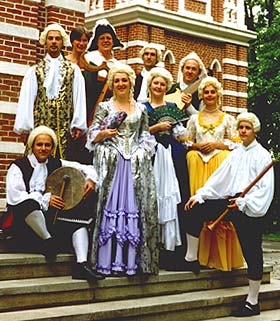
Insula Magica, 2001.
|
In seeking a suitable for my way of service I recently established The Ark Foundation for Cultural Initiatives as a means for helping artists It aims to support artists and to promote spiritual unity through diverse cultural expression, rather than being focussed on proclaiming the Bahá'í Faith.
For me, culture is a collection of spiritual and physical values, with a means for expressing it, methods for preserving it and ways to spread it. The foundation is primarily for social and economic development. I don't worry about whether it is a ‘Bahá'í’ project or not because I am a Bahá'í and my values are encompassed in Bahá'í values.
One project that is now part of the Ark Foundation's activities is art education for children. We started with one high school in Novosibirsk, where my wife Elena teaches. Each child studies some aspect of the arts, which involves learning about other cultures. The government supports this project but gives little financial backing, so money is collected from parents and we use donations of instruments, equipment and so on to support the program. The project has been going for 19 years now and has been so successful that many pupils have moved directly into professional arts studies.
|
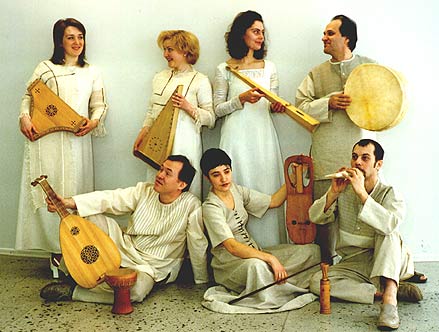
Insula Magica 2001.
|
Another project has been to create a mobile museum of the history of music. I know of only two museums of music in Russia and these are in Moscow and St. Petersburg. So people from Siberia need to travel at least 3000 km to see them. In 2001 travelled to Holland to buy a harpsichord to add to the collection. It was the first authentic harpsichord in Siberia.
My musical ensemble, ‘Insula Magica’ (Magic Island), is the basis for the museum, and it performs as part of the display.
|
The group started performing twenty years ago with students from the conservatory. The name of the group came out of a time when there was not a lot of music around, so we saw ourselves as an island of magic from a previous time. After peristroika, artists and musicians lost the little government funding there was and so we have always had to find our own funding to pay for instruments and costumes.
Currently there are four singers and three instrumentalists; some of the singers also play instruments. We play everything from medieval to Baroque. In March 2001, Insula Magica will celebrate its 10th anniversary of professional performance for the Novosibirsk Philharmonic Society, with a festival of early music. For more information, see www.nut.adm.nso.ru/culture.
In the summer of 2000 we did the "Echo of Poltava" tour. The purpose of this project was to explore the sources and influences of Swedish music on Russian music during the 18th century and to find out what this music sounded like. Study of this music is important because instrumental music was forbidden in Russia by the Orthodox Church before Peter the Great's reform.
It is said that Peter the Great cut a window into Europe, which is why we chose the title Window into Europe for our first CD.
Poltava is the site in the Ukraine of a huge battle, which took place between Peter the Great and the Swedish king, Karel the 12th. We contacted Swedish musicians, who found 18th century manuscript of music written by an Swedish prisoner G.Blidstoem who had lived in Siberia after that war. These pieces were performed at the time and are the earliest examples of European music being performed in Siberia.
|
We brought the early music duo, Laude Novella (New Songs for Praise), to the prison city Tolbolsk (northern Siberia) where we performed this music together (after two centuries). We also performed in Moscow and Novosibirsk and will perform in Riga (Latvia) and Sweden in the summer of 2001.
|
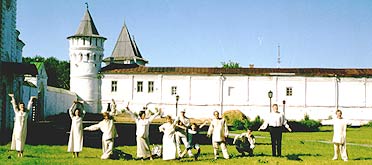
Insula Magica, in the north Siberian prison city, Tolbolsk, 2000.
|
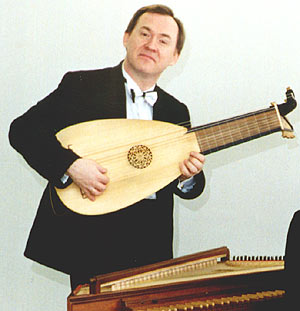
Arkadij Bourkhanov, 2000.
|
For the program, we chose music from the time of Peter the Great and the Swedish musicians chose their music from the same period. Coincidentally two pieces we performed had the same melody in the same pitch. So it was a very clear example of how Russian music has been influenced by European music.
In 1997 we created our first CD and we have just released a new CD Renaissance Music. Please contact me if you are interested in collaborating with or supporting our projects in anyway.
Email for The Ark Foundation for Cultural Initiatives:
Arkadij Bourkhanov, ark@mail.cis.ru
|
- Article + Photographs: in the book, Just Let the Wind, 2006
- Artist Profile: Arts Dialogue, June 2001
- Reviewed: Barca de Venetia per Padova
Arts Dialogue, October 2000
- Artist Profile: Arts Dialogue, March 1995
|

Arts Dialogue, Dintel 20, NL 7333 MC, Apeldoorn, The Netherlands
email: bafa@bahai-library.com
|
|









